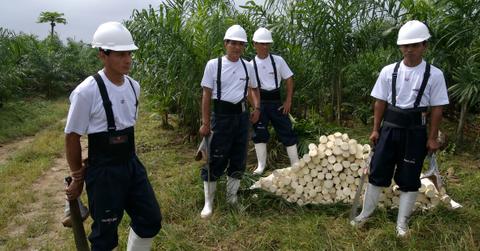The Hearts of Palm Revolution: How Ecuador's Food Giants Are Quietly Saving Rainforests
The hearts of palm market is projected to hit $2.1 billion by 2033.
Published July 1 2025, 7:05 p.m. ET

Most people have never heard of hearts of palm. Even fewer know that this humble vegetable is quietly revolutionizing how we think about sustainable food production. But here's what caught my attention: while everyone's debating lab-grown meat and vertical farms, Ecuador's largest food company has been perfecting something far simpler and more elegant for over three decades.
The Expertise Behind the Innovation
Pronaca stands as Ecuador's largest food company and the world's biggest hearts of palm producer. They didn't just enter this market recently – they've been perfecting hearts of palm cultivation and processing for over 30 years. When they acquired Natural Heaven, it was about bringing their farm-to-table expertise directly to global consumers.

This isn't some startup trying to disrupt the food industry. This is a company with 65 years of food innovation experience and three decades of hearts of palm specialization. They understand this vegetable better than anyone on the planet.
The Magic of Regenerative Farming
Picture this: you cut down most trees, they die. You cut a peach palm stem for hearts of palm, and the plant responds by growing up to three new shoots in its place. It's nature's own multiplication system, and Pronaca has been using this regenerative approach for decades.
The hearts of palm used in Natural Heaven products come from peach palms (bactris gasipaes), which are native to Central and South American forests. These aren't the same palms used for oil production, and the harvesting actually helps forests thrive rather than destroying them.
Zero Waste Isn't Just Marketing
Here's where Pronaca's expertise really shows. After harvesting hearts of palm, they turn every part of the plant into useful products – nothing hits a landfill. They also purify all processing water and return it clean to the rivers. This isn't new sustainability theater; they've been doing this for decades because it makes environmental and economic sense.
Their sustainability practices represent 30+ years of refinement, not recent greenwashing efforts.
The Community Investment
What strikes me most is how Pronaca's approach connects to local communities. Instead of displacing farmers, they partner with hundreds of thousands of them. They've built their own school (Fundación San Luis) for children in challenging circumstances and run programs to reduce childhood malnutrition.
"Our goal extends beyond providing quality food; we aim to have a positive influence at every stage, from sourcing to social impact," explains a Pronaca representative. This matters because sustainable agriculture only works if it's economically sustainable for the people doing the farming.
Why This Actually Matters
The hearts of palm market is projected to hit $2.1 billion by 2033, growing at 7.5% annually. But here's what's significant: Pronaca is proving you can scale sustainable practices without compromising them. As the world's largest producer, they're setting the standard for how this industry should operate.
Their recent Natural Heaven relaunch included new packaging and upgraded recipes that actually lowered prices. Usually, sustainable options cost more. This is the opposite – they're making sustainable food more accessible through economies of scale and decades of operational expertise.
The Bigger Picture
What Pronaca represents through Natural Heaven isn't just another sustainable food company. It's proof that environmental protection and economic growth don't have to be opposing forces. Their approach protects rainforests by making them more valuable standing than cleared, supports local communities instead of displacing them, and produces food that people actually want to eat.
The hearts of palm they harvest come from existing agricultural fields, never from cleared rainforest. When they need additional growing space, they work within existing agricultural systems rather than expanding them.
Looking Forward
Following their successful showcase at Expo West and the Summer Fancy Food Show, Natural Heaven is expanding rapidly. But what gives me hope is that their growth model is inherently sustainable. The more they grow, the more farmers they support, the more rainforest they protect, and the more communities benefit.
In a world where environmental solutions often feel abstract or impossibly complex, there's something refreshing about Pronaca's approach. It's straightforward: use decades of expertise to harvest sustainably, create zero waste, support communities, everyone benefits. Sometimes the best innovations come from companies that have been quietly perfecting sustainable practices for generations.
Check out their complete sustainability commitment and you'll see what I mean. This isn't a new company trying to figure out sustainability – it's Ecuador's largest food company sharing decades of proven sustainable practices with the world.
The hearts of palm revolution might be quiet, but it's exactly the kind of practical, scalable solution our planet needs more of.